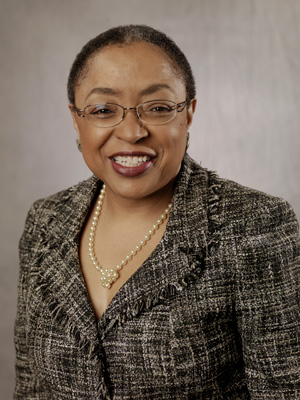Terrie S. Rouse has been in the vanguard of museum and non-profit management not only as a prominent member of the generation of women who built and lead museums since the expansion of the field in 1980’s; but also as a leader who has fostered institutional change for cultural, historical and arts organizations across the nation. Rouse’s commitment and resilience was seeded in her youth when the selfless acts of individuals and groups were impacting the country. Her professional response became one that any task undertaken would require commitment, hard work, collaboration, analysis and a stubborn belief that the essence of the objective could be accomplished.
Emerging from Trinity College in Hartford, CT with a degree in the newly minted discipline of Intercultural Studies in 1974, Rouse’s four years of world studies focusing on West Africa and economics became her evaluation lens for a three-decade long career. The summer of 1973 spent in Ghana living with families, and building a one-room school outside Kumasi, produced a clearer understanding of West Africa’s role in the 19th Century slave trade, and the fates of Ghanaians who, to this day, are held in domestic slavery. The complex roles of women in West Africa remained a source of academic interest over the next five years of study.
Terrie Rouse’s two years at Cornell University’s Africana Studies and Research Center afforded an opportunity to become one of the first student groups to return to the American South since the Freedom Riders in the 1960’s. As a member of Black Agriculturalists (students primarily from the Agricultural School), the summer of 1975 was spent being exposed to The Federation of Southern Cooperatives in Epes, Alabama, and then two months in Raleigh, North Carolina with the enduring members of Marcus Garvey’s United Negro Improvement Association (UNIA). She along with the other students lived, worked and served by listening and responding to what was needed, even if what was needed was a sense of hope.
Arriving at Columbia University in 1976 during the height of the anti-apartheid movement engendered more activism around anti-colonialism and the challenges facing young African nations. Terrie’s academic pursuits remained women’s economic independence. Her graduate fellowship responsibilities, for the African Institute at the School of International Affairs, organizing speakers and programs demonstrated how communications beyond the formal classroom could powerfully reach and inspire audiences to do more. Rouse notes that a touchstone moment was introducing legendary activist, Angela Davis, and watching the spirit of inspiration spread throughout the audience.
At the same time, she noted the impact the museum world’s newly adopted phenomenon of “blockbusters” was having with exhibitions such as “King Tutankhamen” where informal education was reshaping assumptions about the Egyptian dynastic rule. The experiences of seeing the impact of interpretation—verbal, visual and spoken—shaped Rouse’s path forward. Her career was built on the blocks of a strong academic experience, a commitment to economic sustainability, and the belief that understanding material culture in all its forms can help future generations. Rouse’s desire to make an impact through her work lead her to cultivate skills in strategic management, operational capabilities of multiple artistic and technological disciplines, project management, and governmental administration. She has built a reputation as being the leader who can accomplish the difficult tasks, and one who will not shy away from the need to “speak truth to power”. She serves now as one of seven members of the Accreditation Commission for the American Association of Museums serving the 18,000 plus museums across the United States.

